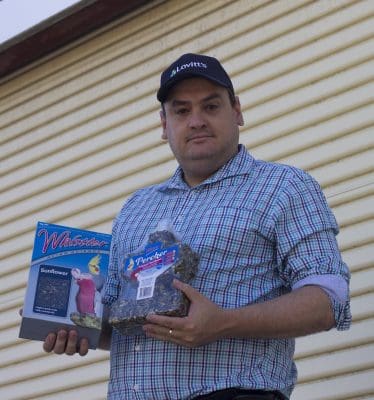LARGE, seed eating birds are both a friend and a foe for sunflower growers. Parrots and cockatoos can cause damage in ripening sunflower paddocks.
However, the avian pet industry also represents a significant marketing opportunity for farmers.

Lovitt’s Queensland operations manager, David Curtis, says that in addition to the bird seed market, sunflower seed also features in their pet food mixes for pet rabbits and guinea pigs.
The Australian Veterinary Association estimated that Australians keep about 4.2 million birds as pets (2016).
An unknown number of us also provide feed supplements for wild birds that visit backyards.
In winter 2016, 47,000 residents completed a survey indicating that they provide food for native birds in their backyard (The Australian Bird Feeding and Watering Study – a citizen science database study).
For Australian sunflower growers this represents an opportunity to supply seed to seed mixes and seed blocks suited particularly to birds such as parrots, cockatiels, parakeets, peach faces and other similar seed-eating caged and wild birds.
Last year, pet food company Lovitt’s Group acquired Queensland seeds company Takari Seeds based in Toowoomba. Takari, now Lovitt’s, continues to buy sunflower seed from growers.
Queensland operations manager, David Curtis, said that in addition to the bird seed market, sunflower seed also featured in their pet food mixes for pet rabbits and guinea pigs.
Although not generally used in poultry farm rations, some backyard hens are also fed sunflower seed as part of their diet.
“We produce birdseed and small animal feed mixes for the domestic and international market and machine dressed sunflower seed for the stock feed industry in New Zealand,” he said.
“In the last few months supplies of sunflower seed has been tight and we have been relying on the crop in Central Queensland. Unfortunately, the crop size is looking small at this stage so there will be strong competition in the market to secure good quality seed.”
Seed weight critical
Mr Curtis said Lovitt’s would normally source a few hundred tonnes of sunflower seed from Central Queensland growers.
“Seed weight is critical for us. We generally don’t forward contract because we just can’t accept seed that is too light,” he said.
Generally, growers supply a one kilogram sample after harvest that Lovitt’s test for weight and screenings before offering the grower a price.
Seed usually needs to meet the minimum GTA specification of 38kg/hectolitre to be accepted in the pet and stock feed market.
Lovitt’s buy both black and grey (striped) sunflower seed, both being used in birdseed mixes and black seed going to stock feed.
Mr Curtis said most birds ate sunflower seed and it was particularly important in providing additional energy leading into and during winter.
“Two years ago there was a shortage of sunflower seed in Australia and prices rose as high as $1400 per tonne,” he said.
“Last year supply was abundant but prices never fell below $630 per tonne. It is probably safe to budget on between $700/t and $800/t when comparing planting options.”
Appearance key
Appearance of the seed and low screenings are key to success in this market.
Australian Sunflower Association chairman, Kevin Charlesworth, recommends growers spend the time required to set their harvester up to produce the best quality sample.
“Consider using header attachments such as a sunflower tray and reel, and operate the drum at low speed,” he said.
“Open the drum as wide as it will go and adjust the chaffer, shoe sieve and fan speed to achieve a clean sample with minimal split seeds.”
Visit the Better Sunflowers website www.bettersunflowers.com.au or email the Better Sunflowers coordinator, Alicia Dunbar [email protected]



HAVE YOUR SAY